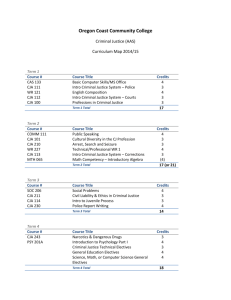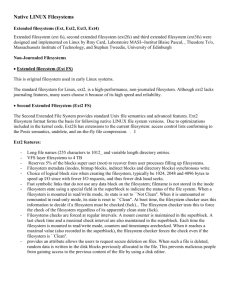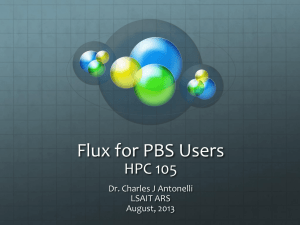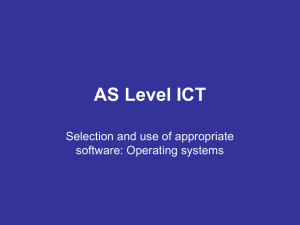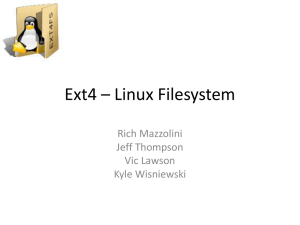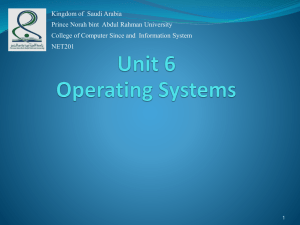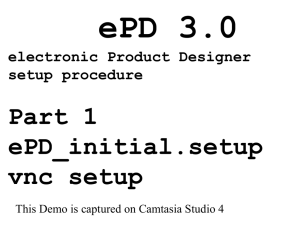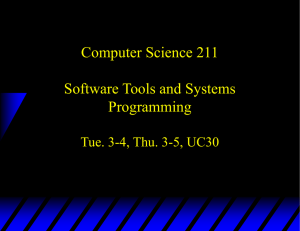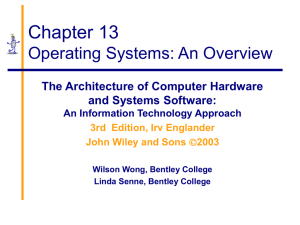The UNIX Filesystem - University of Michigan
advertisement
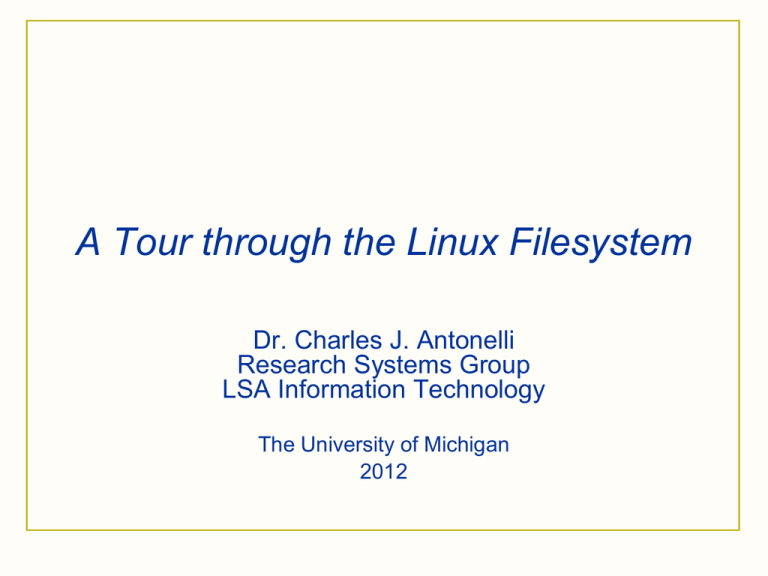
A Tour through the Linux Filesystem Dr. Charles J. Antonelli Research Systems Group LSA Information Technology The University of Michigan 2012 Roadmap • UNIX Filesystem History • Linux Filesystem Theory • Linux Filesystem Practicum 06/12 cja 2012 2 The UNIX Filesystem Filesystem Concepts • Filesystems organize file data on permanent media • Filesystems create and associate file data and metadata • Filesystems provide secure, scalable, efficient permanent storage 06/12 cja 2012 4 The UNIX Filesystem • In the beginning, there were two UNIX™ File System (1971)1 Berkeley Fast File System (1983)2 06/12 cja 2012 5 After that, things got complicated http://en.wikipedia.org/wiki/Berkeley_Software_Distribution 06/12 cja 2012 6 UNIX™ File System Disk Layout Stolen from “A Fast File System For UNIX,” Presented by Zhifei Wang UNIX™ Inodes Inodes (“Index nodes”): 1. File ownership information 2. Time Stamps for last modification/acces s 3. Array of pointers to data blocks of the underlying file Stolen from “A Fast File System For UNIX,” Presented by Zhifei Wang Berkeley Fast File System • Addresses performance issues by dividing a disk partition into one or more cylinder groups Excerpted from “A Fast File System For UNIX,” Presented by Zhifei Wang UNIX Filesystem Concepts • A (regular) file is a linear array of bytes that can be read or written starting at any byte offset in the file • The size of the file offset determines the absolute maximum size of any file: Offset size, bits 06/12 Maximum file size, bytes 16 216 65,536 32 232 4,294,967,296 64 264 1.84e+19 128 2128 3.40e+38 cja 2012 10 UNIX Filesystem Concepts • File names are stored in a file called a directory • Directories may refer to other directories as well as to files • A hierarchy of these directories is called a filesystem • Each filesystem tree (a connected graph with no cycles) has a single topmost root directory • Hardware devices are represented as special files • A UNIX mantra: everything is a file 06/12 cja 2012 11 UNIX Filesystem Concepts • The root of one filesystem may be mounted on a mount point of another filesystem • The user sees one aggregated filesystem with one root, while the operating system manages several logical filesystems, each on a different device • A filesystem device may be physical permanent storage, a portion of same, an aggregation of same (a logical volume), a remote filesystem, physical volatile storage, or a file stored in another filesystem 06/12 cja 2012 12 Absolute vs. relative path names • A file is accessed using its path name • Absolute path name /dir1/dir2/…/dirn/filename /opt/moab/etc/moab.cfg • Relative path name current-working-directory/filename moab.cfg • Every process maintains a notion of a current working directory Initialized at login from /etc/passwd home directory field Changed via chdir() system call 06/12 cja 2012 13 UNIX Filesystem Implementation • An inode (index node) contains bookkeeping information about each file. Inode numbers are unique to a filesystem • A hard link is a directory entry which contains the target file’s inode • A symbolic link is a directory entry which contains the inode of a special file containing the path name to the target file 06/12 cja 2012 14 Directories • A special file which maps names to inode numbers • There are always 2 hard links . (dot) is self-referential .. (dotdot) refers to the parent directory • File permissions are stored in the inode, and not the directory 06/12 cja 2012 15 Directories • A hard link results in two (or more) directory entries that point to the same inode Can’t hard link directories Can’t cross filesystem boundary Identical permissions for different links • A soft link is a separate directory entry whose file contains a pathname Can soft link directories t Now it’s a filesystem graph Can cross filesystem boundary Separate permissions for different links “Dangling softlink” if pointed-to file is deleted 06/12 cja 2012 16 File Permissions I • Three permission bits, aka mode bits Files: Read, Write, Execute Directories: List, Modify, Search • Three user classes User (File Owner), File Group, Other 06/12 cja 2012 17 File Permissions, examples -rwxr-xr-x cja lsait file read, write, and execute rights for the owner, read and execute for others -rwsr-x--x cja lsait same permissions as above, but on exec() the process will run with cja’s credentials drwxr-x--x cja lsait list, modify, and search for the owner, list and search for group, and execute only for others 06/12 cja 2012 18 File Permissions II • Three special bits: Setuid t Executable has file owner’s user id, not invoker’s Setgid t Executable has file group’s group id, not invoker’s Sticky t Directory: only owner of the directory or of a file it contains can delete or rename the file 06/12 cja 2012 19 File Permissions, intermezzo • Given -rw-r--r-x cja lsait What rights would drhey have to this file? 06/12 cja 2012 20 UNIX Filesystem The UNIX filesystem buffer cache improves performance while maintaining “UNIX semantics” Write changes seen by subsequent readers File reads obviate disk reads if the data are already buffered File writes are buffered but not immediately written to disk Metadata writes are ordered and written synchronously to enable fsck to function correctly 06/12 cja 2012 21 UNIX Filesystem This buffering is a potential source of file system inconsistency, since the filesystem state on disk can differ from the in-memory filesystem state If the operating system crashes, you will lose the in-memory state The fsck utility restores disk filesystem consistency But the time taken is proportional to the filesystem size, regardless of activity 06/12 cja 2012 22 Linux Filesystems Create an ext4 filesystem 1. ssh student@ci.lsait.lsa.umich.edu 2. mkdir uniqname; cd uniqname 3. dd if=/dev/zero of=mydev bs=`expr 1024 \* 1024` count=100 4. mkfs -F -t ext4 mydev 5. mkdir mymnt 6. sudo mount mydev mymnt 7. dumpe2fs mydev 06/12 cja 2012 24 Phasers on stun, please, Mr. Sulu! 06/12 cja 2012 25 Linux ext4 • Fourth extended filesystem Minix (pre-1992) ext (1992) ext2 (1993) ext3 (2001) ext4 (2008) 06/12 cja 2012 26 Minix fs • Toy filesystem, used for teaching • 14-character file names • 16-bit file offsets => 64 MB maximum file size 06/12 cja 2012 27 ext • First Linux filesystem to use VFS API • 255-character file names • 32-bit file offsets => 2 GB maximum file size 06/12 cja 2012 28 Linux block mapping Cao et al, Ottawa Linux Symposium, 2005. 06/12 cja 2012 29 ext2 • Re-implementation of ext With ideas from Berkeley FFS • 255-character file names • 64-bit file offsets => 264 GB theoretical maximum file size t Really 16 GB and up, depends on file system block size and block pointer size 06/12 cja 2012 30 ext3 • Journaling Data and/or metadata are written to the journal before being committed After a crash, the journal is replayed at boot to restore filesystem consistency => replay time depends on level of activity in a filesystem and not its size 06/12 cja 2012 31 ext3 • Journaling levels Journal: data and metadata journaled (slowest, safest) Ordered: metadata journaled, data writes completed before entry committed to journal, à la fsck (faster, safer, default) Writeback: metadata journaled, data writes unsynchronized (fastest, riskiest) /home/cja/mydev on /home/cja/mymnt type ext4 (rw,relatime,seclabel,user_xattr,acl,barrier=1,data=ordered) 06/12 cja 2012 32 ext3 Prabhakaran et al 2005, Proc. USENIX Annual Conference 06/12 cja 2012 33 Compare journaling performance 1. cd ~/uniqname/mymnt 2. time for f in `seq 1 100`; do for g in `seq 1 100`; do mkdir $f.$g; done done; time for f in `seq 1 100`; do for g in `seq 1 100`; do rmdir $f.$g; done done 3. cd .. 4. sudo umount mymnt 5. sudo mount mydev mymnt -o data=writeback,noatime,barrier=0 6. cd mymnt 7. time for f in `seq 1 100`; do for g in `seq 1 100`; do mkdir $f.$g; done done; time for f in `seq 1 100`; do for g in `seq 1 100`; do rmdir $f.$g; done done 06/12 cja 2012 34 ext3 • Access control lists Access may be controlled for arbitrary users and groups t No longer limited to user,group,other Set for files and directories t Directories may have default ACLs t ACLs are inherited Discretionary 06/12 cja 2012 35 Manipulate ACLs 1. 2. 3. 4. 5. 6. 7. 8. 9. 10. 11. 12. 13. 14. 15. 16. 17. 06/12 cd ~/uniqname/mymnt mkdir foo; cd foo; echo bar>bar; ls -la getfacl bar setfacl -m u:cja:r bar getfacl bar echo baz>baz getfacl baz ls –l setfacl -d -m u:tcpdump:rx . getfacl . echo quux>quux getfacl quux mkdir qqsv getfacl qqsv cd qqsv echo foo>foo getfacl foo cja 2012 # # # # # # # # # # # # # # # notice mode bits end with . no acls on bar, just mode bits set an acl on a file user cja has read rights create a file user cja has no read rights mode bits with acls end with + assign default acl see what it looks like # create a file user cja has read rights make a subdirectory it inherits the default rights enter the new subdirectory create another file user cja has read rights 36 ext3 • HTree indexing of directory names Linear search suffers O(n) performance B-trees allow O(log2n) search/insert/delete but need balancing and require complex algorithms HTrees have similar benefits but simpler to implement t Hash, high fanout, constant depth t No balancing required 06/12 cja 2012 37 ext3 • File system online growth Can increase (and decrease) filesystem size without reboot • Backwards-compatible with ext2 ext3 can mount ext2 filesystems ext2 forward compatible in some cases 06/12 cja 2012 38 Resize a filesystem 1. 2. 3. 4. 5. 6. 7. 8. 9. 10. 06/12 cd ~/uniqname sudo umount mymnt cat mydev mydev >bigdev sudo mount bigdev mymnt df -kh mymnt … verify filesystem is still 100 MB in size sudo umount mymnt e2fsck -f bigdev resize2fs bigdev sudo mount bigdev mymnt df -kh mymnt cja 2012 39 ext4 • • • • 1 EB maximum filesystem size 16 TB maximum file size 64,000 maximum directory entries Extents for contiguous allocation 128 MB extent with 4 KB block size • Backwards-compatible with ext3 & ext2 Ext3 forwards-compatible in some cases 06/12 cja 2012 40 ext4 • Persistent pre-allocation Pre-allocate contiguous space Media streaming, databases • Nanosecond-granularity timestamps Date-of-creation timestamp, filesystem only • relatime option Only updates atime if old atime older than mtime or ctime (can check is file was read after being written without atime cost) • Several other enhancements Journal checksums, online defragmentation, faster fsck, multiblock & delayed allocation 06/12 cja 2012 41 References 1. 2. 3. 4. 5. Maurice Bach, The Design of the UNIX Operating System, ISBN 978-0132017992, Prentice Hall, 1986. Dennis M. Ritchie, Ken Thompson, “The UNIX Time Sharing System,” Communications of the ACM, Vol. 17 Issue 7, pp. 365-375, July 1974. http://dl.acm.org/citation.cfm?id=361061 Marshall K. McKusick, William N. Joy, Samuel J. Leffler, and Robert S. Fabry, “A Fast File System for UNIX,” ACM Transactions on Computer Systems, Vol. 2, No. 3, pp. 181-197, August 1984. http://dl.acm.org/citation.cfm?id=990 http://en.wikipedia.org/wiki/Berkeley_Software_Distribution http://en.wikipedia.org/wiki/Ext4 et al 6. 7. http://kernel.org/doc/Documentation/filesystems/ext4.txt Vijayan Prabhakaran, Andrea C. Arpaci-Dusseau, and Remzi H. Arpaci-Dusseau, “Analysis and Evolution of Journaling File Systems,” Proc. USENIX Annual Technical Conference, 2005. 8. http://kerneltrap.org/node/14148 9. http://en.wikipedia.org/wiki/Filesystem_Hierarchy_Standard 10. Sandberg, R., Goldberg, D., Kleiman, S., Walsh, D., and B. Lyon, "Design and Implementation of the Sun Network Filesystem," Proc. 1985 Summer USENIX Technical Conference. 11. Sun Microsystems, Inc., "NFS: Network File System Protocol Specification", RFC 1094, March 1989. http://www.ietf.org/rfc/rfc1094.txt 12. Pawlowski, B., Juszczak, C., Staubach, P., Smith, C., Lebel, D., and D. Hitz, "NFS Version 3 Design and Implementation", Proc. USENIX 1994 Summer Technical Conference. 06/12 cja 2012 42
